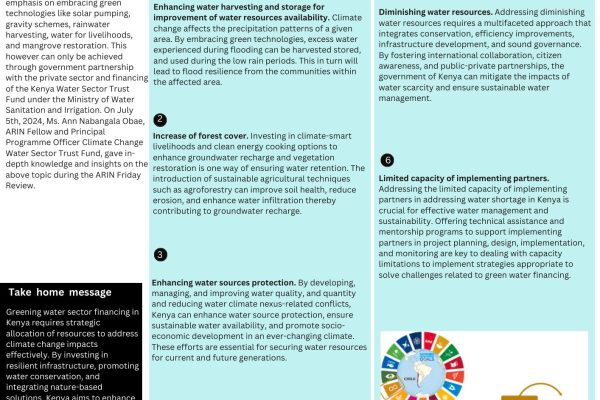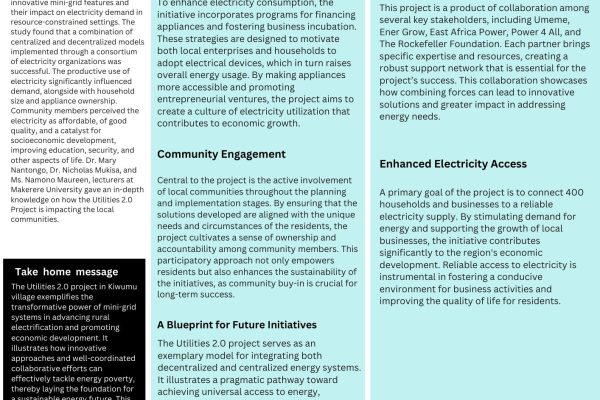Introduction.
Sub-Saharan Africa faces a persistent energy deficit with over 600 million people lacking reliable access to electricity. This energy gap hinders economic growth, social development and quality of life across the region. Traditional centralized energy systems have struggled to meet the growing demand, leaving vast areas in darkness. The presentation examines the current landscape of decentralized energy systems in Sub-Saharan Africa, analyzing successful implementations, innovative financial models, and the policy frameworks that support their adoption. This review explored how decentralized energy systems can effectively bridge the energy deficit in Sub-Saharan Africa by addressing key challenges and highlighting successful strategies for widespread adoption as presented by Onyekachi Nwafor,ARIN Fellow and CEO at KatexPower, Nigeria on September 06, 2024.
Key Messages.
Addressing Energy Access Challenges
Sub-Saharan Africa faces a profound challenge regarding energy access, with millions of individuals lacking dependable electricity supplies. The establishment of decentralized energy systems, including mini-grids and off-grid solutions, presents a promising path forward. These innovative systems can function independently from traditional centralized power grids, making them particularly well-suited for rural and marginalized communities. By extending the reach of energy services to these areas, we can create vital connections to essential resources and opportunities.
Promoting Renewable Energy Sources
Decentralized energy systems frequently harness renewable energy resources such as solar, wind, and hydropower. Given the rich abundance of these resources across Sub-Saharan Africa, they offer a sustainable solution that addresses both energy needs and environmental concerns. By prioritizing renewable energy sources, these systems not only lessen the reliance on fossil fuels but also contribute significantly to long-term environmental sustainability. Furthermore, harnessing local energy sources lessens transport costs and reduces carbon footprints, paving the way for greener economic growth.
Empowering Local Economies Through Reliable Energy
Access to consistent and reliable electricity is a critical catalyst for stimulating local economies. It enables the operation of small businesses, supports educational institutions, enhances healthcare services, and boosts agricultural productivity. With dependable energy sources, entrepreneurs can thrive, schools can prosper, and clinics can provide essential services. This increased economic activity leads to job creation, improved productivity, and overall community enhancement. In essence, reliable electricity serves as a foundation for comprehensive economic development in rural and underprivileged areas.
Fostering Innovation in Energy Solutions
The implementation of decentralized energy systems also catalyzes innovation in technology and business approaches. For instance, the introduction of pay-as-you-go solar energy models and the integration of mobile payment platforms have transformed how energy is accessed and paid for in rural Africa. These solutions not only make electricity more affordable but also expand accessibility, allowing users to pay according to their means. The drive for innovative solutions in the energy sector reinforces the ability of communities to independently manage their energy needs and fosters local entrepreneurship.
Enhancing Energy Security and Resilience
Decentralized energy systems significantly bolster energy security by reducing dependence on a centralized power grid, which is often susceptible to outages and disruptions. By diversifying energy sources and delivery methods, these systems provide greater resilience against shocks to the energy supply. This diversification ensures that communities have a more reliable and stable electricity supply, which is critical for essential services and overall community well-being.
Conclusion:
In summary, decentralized energy systems represent a practical and scalable approach to addressing the significant energy deficit faced in Sub-Saharan Africa. By leveraging renewable energy resources, enhancing energy security, empowering local economies, and nurturing innovation, these systems have the potential to fundamentally reshape the energy landscape. They can significantly improve the quality of life for millions of individuals across the region. Embracing decentralized energy solutions is an essential step toward achieving sustainable development and promoting energy equity, paving the way for a brighter economic future for Sub-Saharan Africa.




